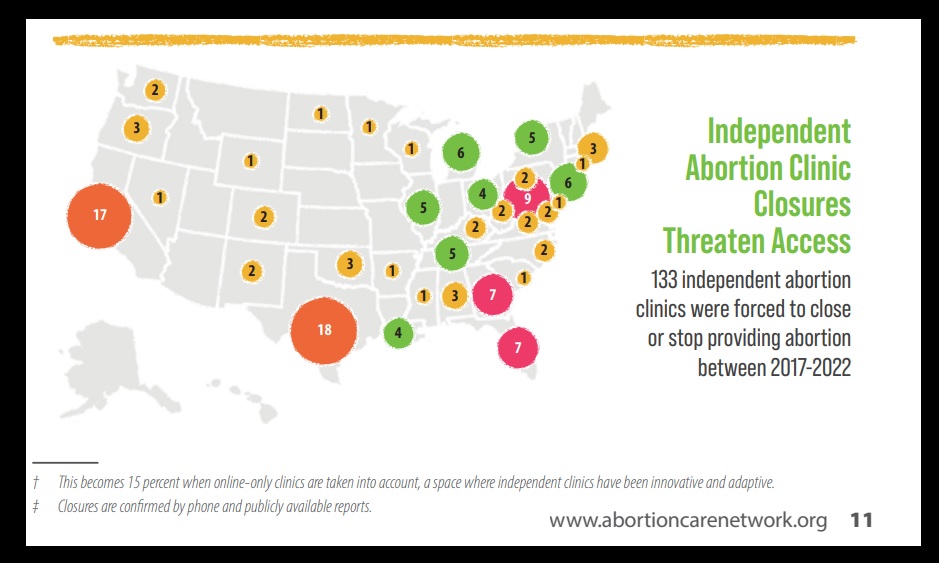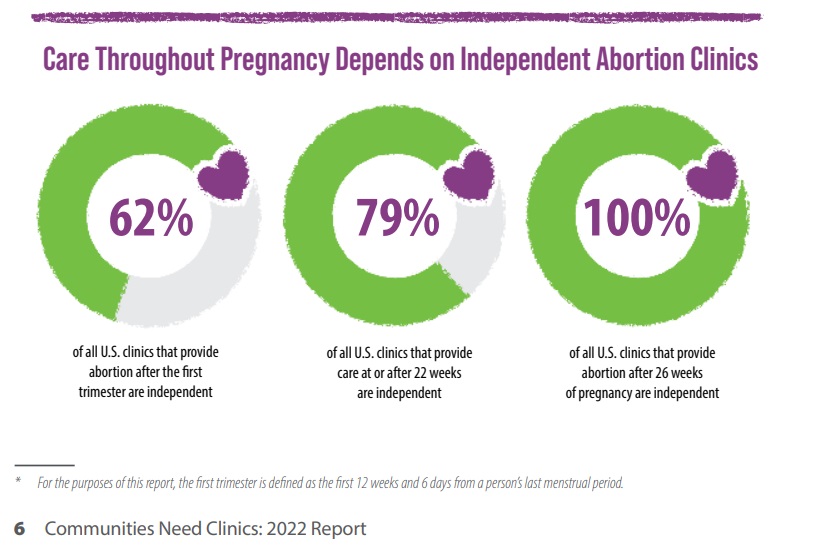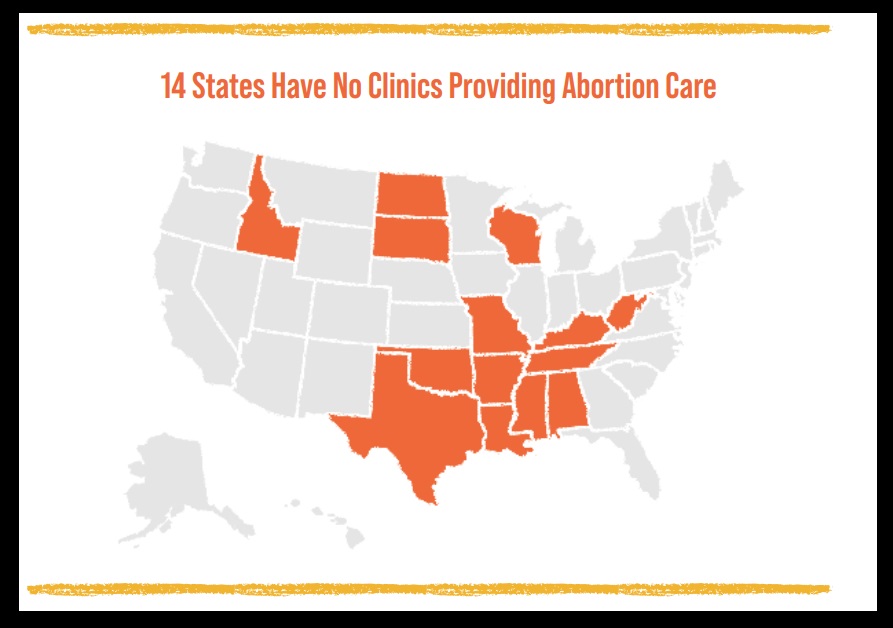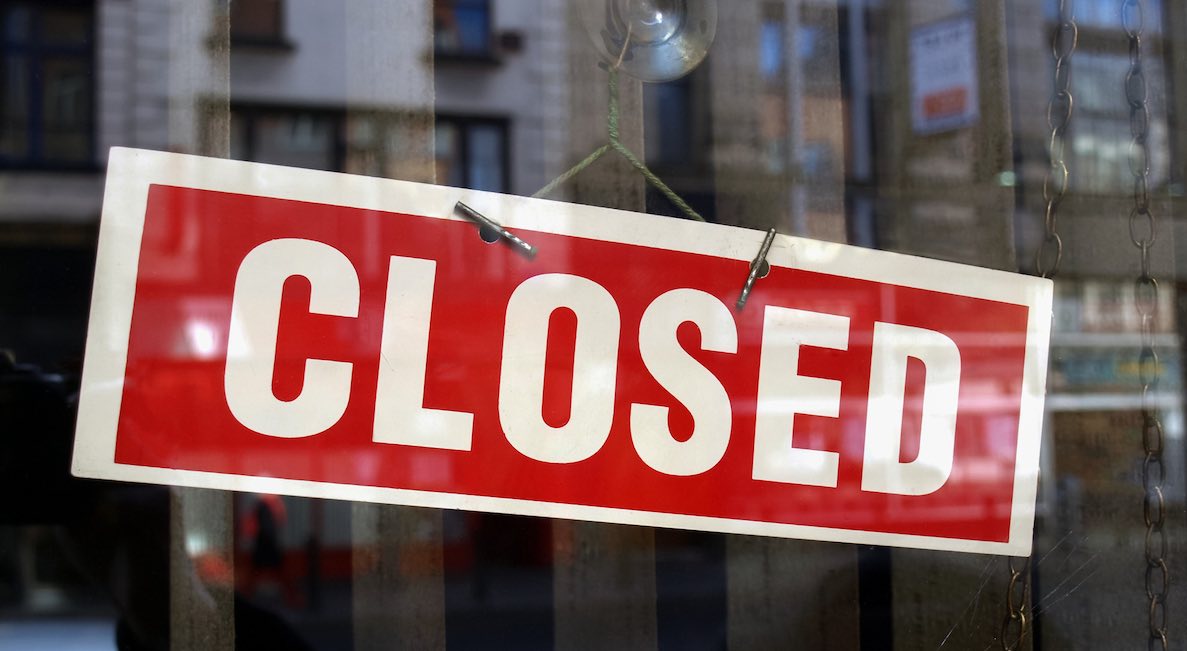The declining number of surgical abortion facilities is no secret — it’s been happening for over a decade. But as more of the abortion industry has begun to rely on early abortion via the abortion pill (often referred to as “medical abortion,”) those numbers have begun to dwindle even further, as at-home abortion via the abortion pill — shown to be four times as risky for women as a first-trimester surgical abortion — has grown in popularity and profitability. Particularly affected by this trend are the “independent” abortion facilities, which are not part of large corporations like Planned Parenthood.
A report recently published by the Abortion Care Network (ACN), a “national association for independent community-based, abortion care providers and their allies,” claimed that there were “35% fewer brick-and-mortar indie [independent] clinics than there were a decade ago, and fourteen states are without a single abortion clinic.” The report also stated that since 2017, 133 independent abortion clinics (excluding Planned Parenthood facilities, hospitals, and physician offices) have been closed.
But ACN, which was founded by leaders of the National Coalition of Abortion Providers (NCAP) and the Abortion Conversation Project (ACP), may be using the news to raise millions in donations. According to the report, ACN has received “nearly five million dollars to indie clinics via Keep Our Clinics” in donations this year alone and the group claims that independent abortion clinics (IACs) are “fighting back against anti-abortion state legislation, and rallying their communities to uplift state ballot measures that protect abortion.”

Abortion Care Network graph for 2022 reveals abortion clinics closing across USA
Live Action News previously documented that, in 2021, ACN reported that 20 IACs had been shuttered, an increase from the 14 closures in 2020. But the newly released 2022 report has indicated that 42 abortion clinics closed in 2022, twice as many as 2021.
But the Biden Administration’s move to lift important safety requirements on the abortion pill has released an explosion of virtual abortion facilities onto the landscape, which may be taking the place of brick-and-mortar clinics.
Closed abortion facilities
“For the purposes of this report, a clinic is considered closed if the clinic or practice closed entirely, or if the clinic or practice remains open but no longer provides abortion care services,” ACN wrote.
“When Abortion Care Network started tracking clinic closures in 2012, we identified 510 independent abortion clinics open in the U.S. As of November 2022, ACN identified 434 independent abortion clinics, 333 of which are brick-and-mortar clinics,” ACN reported, adding, “While there have been a surge of independent, online-only clinics since 2020 and a handful of brick-and-mortar clinic openings over the years, the overall number of brick-and-mortar independent clinics in the U.S. has decreased by 35 percent since 2012.”
The report, published in partnership with ineedanA.com, indicated that between 2017 and 2022, 133 abortion facilities closed.
“Since 2017, Abortion Care Network has identified 133 independent abortion clinic closures. Seventeen independent clinics closed in 2017; 13 closed in 2018; 27 closed in 2019; 14 closed in 2020; 20 closed in 2021. As of November 2022, we have confirmed 42 independent clinic closures in 2022,” ACN wrote.
Virtual abortion facilities
According to ACN, “only 31 states and Washington DC allow clinics to provide abortion via telemedicine… However, 19 states ban the virtual provision of abortion care, including telemedicine,” ACN wrote.
The group added that, “23 percent of independent, brick-and-mortar clinics provide at least some aspects of abortion services via telemedicine.”
Yet, according to the ACN report, there are now 100 independent virtual abortion businesses selling abortion pills by mail. IACs accounted for “98 percent of all virtual clinics in the U.S,” the report also claimed. This is a substantial increase from the roughly 33 virtual abortion businesses ACN reported they had in 2021.
Virtual abortion businesses are far more profitable because they require less overhead and are largely unregulated. In addition, online abortion businesses often offer the abortion pill regimen to minors while providing less than a few minutes of implied care with little to no follow-up.
Independent abortion clinics (IAC) commit majority of abortions
Independent abortion clinics (IACs) make up the majority of facilities that commit abortions, the group claimed.
According to the report, “Although independent abortion care providers represent about 24 percent of all facilities offering abortion care, they provide 55 percent of all abortion procedures nationwide.”
And, while IAC’s committed 62% of abortions in the first trimester, IACs “represent 66 percent of all clinics that provide care at and after 16 weeks of pregnancy, 69 percent of clinics providing care at and after 19 weeks of pregnancy, and 79 percent of clinics that provide care at or after the 22 week of pregnancy. After 26 weeks of pregnancy, the only clinics providing abortion care are independent,” the report stated.
According to the ACN, 55% of abortion procedures were committed by independent facilities, 41% by Planned Parenthood, 3% at hospitals and 1% at physician offices.

Abortion Care Network 2022 commits’ most late term abortions (Image: ACN)
Abortion pill v. in-clinic facilities
The report claimed that IACs were more likely to provide both abortions by pill (“medication” abortions) and in-clinic abortions.
“Eighty percent of brick-and-mortar independent clinics offer both medication and in-clinic abortion care, as compared to Planned Parenthood, where both medication and in-clinic abortion care are available at only 43 percent of affiliated clinics,” the report stated.
In addition, according to the report, 3% of IACs offer in-clinic abortions alone (most likely these would be later abortion facilities) with 17% of independents offering the abortion pill regimen only, while 57% of Planned Parenthood facilities offer just the abortion pill.
The figures differ slightly from a 2021 report previously published by the American Life League, which found that 391 of Planned Parenthood’s 567 active locations (69%) offered either chemical or surgical abortions, with a majority committing chemical abortions only, and the remainder offering both chemical and surgical options.
Total number of abortion facilities nationwide
The total number of abortion facilities nationwide varies slightly depending on how an abortion clinic is defined.
A survey conducted by the pro-life group Operation Rescue found that as of October and November of 2022, there were 683 abortion facilities operating nationwide.
Abortion clinic numbers published by pro-abortion groups for 2020 also varied.
A 2020 report entitled, “Abortion incidence and service availability in the United States, 2020,” written by Guttmacher researchers, found that while there were 1,603 abortion facilities in 2020, just 807 of those were categorized as abortion clinics.
A separate report published by The Alliance, a group of pro-abortion state advocates, found even fewer abortion clinics in 2020, noting that in the past 42 years, abortion facilities have declined over 72% (from 2,749 in 1978 to 780 recorded in 2020). Pro-life pregnancy help centers outnumbered abortion clinics three to one that same year.
Impact of Dobbs v. Jackson Women’s Health Organization
“In June of 2022, the Supreme Court overturned Roe v Wade in their ruling on the Dobbs v Jackson Women’s Health case. As a direct result, there are fourteen states with no abortion-providing clinics as of November 2022. Since Abortion Care Network began tracking independent clinic status in 2015, there has never been a state without at least one clinic,” the ACN report stated.
In October of this year, a report published by the Guttmacher Institute claimed that within 100 days after the Supreme Court overturned Roe v. Wade, 66 of 79 abortion clinics in 15 U.S. states stopped offering abortions, and 26 of those clinics shut down entirely. A Society for Family Planning (SFP) report has since claimed that the fall of Roe has resulted in a reduction of nearly 11,000 abortions.

Abortion Care Network 2022 – 14 states are abortion clinic free (Image: ACN)
“In states that banned or severely restricted abortion, abortion rates fell by 95 percent following the overturning of Roe—with no comparable rise in abortion in states where abortion is legally protected,” ACN wrote. “Many clinics have been forced to close and plan to re-open in states where abortion is legally protected,” ACN stated, adding that “When abortion clinics are forced to close, they are very unlikely to re-open.”
As abortion facilities – which offer women little “assistance” beyond abortion and profit off women in crisis – continue to close, pro-life pregnancy centers and federally qualified health centers (FQHCs) remain available to women in need.








